| Srl | Item |
| 1 |
ID:
096193
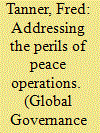

|
|
|
| 2 |
ID:
083083
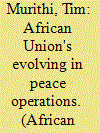

|
|
|
| 3 |
ID:
011639
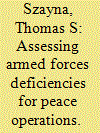

|
|
|
|
|
| Publication |
1996.
|
| Description |
77-91
|
|
|
|
|
|
|
|
|
|
|
|
|
|
|
|
| 4 |
ID:
057717
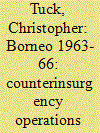

|
|
|
| 5 |
ID:
140768
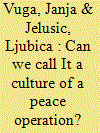

|
|
|
|
|
| Summary/Abstract |
The following article does not discuss various aspects of international cooperation on the political and strategic levels but considers the challenge of cross-cultural cooperation among service members in the field. Cooperation in a culturally diverse environment is influenced by various cultures and identifications (the national culture, military organizational culture, social identities). Based on the presumption that the culture is manifested through the values, rituals, symbols, practices, and language, the thesis about the existence of peace operations’ culture was tested. The main research questions were: (a) how are national and military cultures manifested in a peace operation?; (b) does the culture of a peace operation exist?; and (c) do service members of various nationalities identify themselves with a peace operation? The study was conducted among Italian and Slovenian service members deployed to at least one peace operation. The results show that a peace operation develops practices, values, symbols, rituals, and a common language. Hence we can speak of a peace operation’s culture. The service members’ identification with the peace operation is strong during the deployment; however, sources of identification vary depending on one’s position in the peace operation (i.e., national unit, multi-national HQ). Service members in HQs develop a strong sense of belonging to the multi-national working team, while the main source of common identity for bigger national units is the local environment.
|
|
|
|
|
|
|
|
|
|
|
|
|
|
|
|
| 6 |
ID:
051783
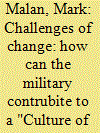

|
|
|
|
|
| Publication |
Dec 03-Feb 04.
|
|
|
|
|
|
|
|
|
|
|
|
|
|
|
|
| 7 |
ID:
051784
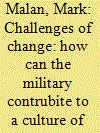

|
|
|
|
|
| Publication |
Dec 03-Feb 04.
|
|
|
|
|
|
|
|
|
|
|
|
|
|
|
|
| 8 |
ID:
057280
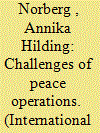

|
|
|
| 9 |
ID:
059600
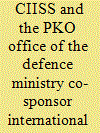

|
|
|
| 10 |
ID:
086199
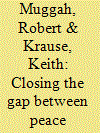

|
|
|
|
|
| Publication |
2009.
|
| Summary/Abstract |
This article highlights how the instruments for addressing the presumed source(s) of armed violence need to be sharpened and extended to address the heterogeneous character of armed violence present in many post-conflict situations. These extensions require the development of practical armed violence prevention and reduction programmes that draw upon scholarship and practice from the criminal justice and public health sectors. The article argues that reducing organized violence and insecurity in post-conflict contexts requires responding to the wider dynamics of armed violence rather than focusing exclusively on insecurity directly connected to what are traditionally defined as armed conflict and post-conflict dynamics; and this requires attention not just to the instruments of violence, but also to the political and economic motives of agents and institutions implicated in violent exchanges at all levels of social interaction.
|
|
|
|
|
|
|
|
|
|
|
|
|
|
|
|
| 11 |
ID:
086201
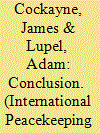

|
|
|
|
|
| Publication |
2009.
|
| Summary/Abstract |
This conclusion reviews the Special Issue's perspective on organized crime as both potential 'enemy' and 'ally' of peace processes. The social and economic power wielded by organized crime is highlighted, pointing to the role that peace operations play as an intervening variable between individuals/communities and the environments in which they operate. Peace operations use a range of tactics, from coercion to co-option, working with or against organized crime. However, these tactics will only be successful if they are framed within a coherent strategy, which may pursue either containment or transformation - or seek to combine them - through a phased transitional strategy. Peace operations should be a key component in a broad strategy of intelligent international law enforcement.
|
|
|
|
|
|
|
|
|
|
|
|
|
|
|
|
| 12 |
ID:
023431
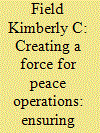

|
|
|
|
|
| Publication |
Winter 2002-03.
|
| Description |
77-87
|
|
|
|
|
|
|
|
|
|
|
|
|
|
|
|
| 13 |
ID:
057713
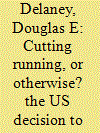

|
|
|
| 14 |
ID:
076742
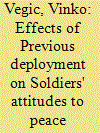

|
|
|
|
|
| Publication |
2007.
|
| Summary/Abstract |
This article is based on surveys in Slovenian contingents which operated as part of SFOR in 2003-04. It explores differences between soldiers who had joined the mission for the first time and those with previous experience. Data analysis focused on soldiers' motivations and personal morale, their expectations regarding the external mission environment and the level of social support at home. The effects of previous experience were found in the way that soldiers conceived their role in the peace operation, in the perception of social support at home and in the type of motivation. As a result of previous deployment, soldiers' beliefs that they could positively contribute to the situation in the area of operation diminished. However, in the case of redeployment, soldiers' motivation remained high but was supported by more utilitarian factors. Perceived public support and reactions from family surroundings also changed as a result of previous deployment experience
|
|
|
|
|
|
|
|
|
|
|
|
|
|
|
|
| 15 |
ID:
067624
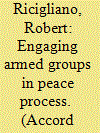

|
|
|
| 16 |
ID:
160016
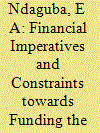

|
|
|
|
|
| Summary/Abstract |
Achievable and viable peace and security efforts in Southern Africa Development Community (SADC) have been limited by an over dependence on foreign and international peacekeeping. The aim of this article is to unpack financial imperatives and constraints towards funding the SADC standby force (SADCSF). Through this the article hopes to provide lessons towards a suitable and sustainable funding mechanism aimed at addressing the financial challenges confronting African standby forces in peace operations. In particular, this article focuses on the SADCSF since its establishment in 2007. This article uses information from existing statistical and research data to first, identify existing funding models in international (regional and continental) peace operation and stand-by forces across the globe. Second, using four critical analytical frames (financial viability, the nature of regionalism, fiscal sustainability and economic landscape), the article highlights various implications of a lack of funding mechanism for regional peace and security in Africa. Third, the article shows that the following are critical to find a sustainable funding mechanism for the SADCSF: the financially demanding variable geometric nature of regional integration in Africa; the proliferation of security agencies; the complex nature of terrorism and interventions; the cost of skill acquisition and training of the multidisciplinary personnel; payment of wounded soldiers and contingents and member state tight budget. Based on international experiences and local realities expounded, this article suggests lessons towards building a suitable and sustainable funding mechanism for African peace and security in general, and regional standby forces in particular.
|
|
|
|
|
|
|
|
|
|
|
|
|
|
|
|
| 17 |
ID:
068445
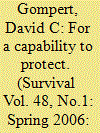

|
|
|
| 18 |
ID:
086192
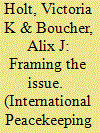

|
|
|
|
|
| Publication |
2009.
|
| Summary/Abstract |
This article examines the links between peace operations and combating transnational organized crime. It argues that while UN Security Council mandates direct UN missions to support establishing the rule of law in states that host peace operations, their role in addressing organized crime is more implicit than explicit. This article notes, however, that UN panels of experts, small fact-finding teams appointed to monitor targeted sanctions, may offer insight into, and options for addressing, such criminal networks. Panel findings and recommendations, however, are not integrated with related UN efforts to build the rule of law. This lack of integration reflects a need, on the part of the UN and its member states, to address better the ability of peace operations, UN panels of experts, and other tools for peacebuilding to contribute more effectively to fighting spoiler networks and organized crime.
|
|
|
|
|
|
|
|
|
|
|
|
|
|
|
|
| 19 |
ID:
057707
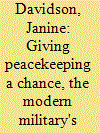

|
|
|
| 20 |
ID:
075713
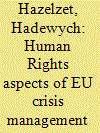

|
|
|
|
|
| Publication |
2006.
|
| Summary/Abstract |
How do we explain under which conditions the EU is likely intervene in one crisis situation and not in another? To what extent have human rights considerations been factored into these operations thus far? This article seeks to answers these questions and describes the decision-making process with respect to EU involvement in crisis management operations and the instruments at the disposal of the EU, with a particular focus on human rights policy. An overview and analysis of current and past civilian and military crisis management operations points to three factors that help to explain EU involvement in crisis situations, namely: norms, interests and institutions. It concludes with suggestions to better integrate human rights into future operations.This article is written in a personal capacity and does not reflect EU positions.
|
|
|
|
|
|
|
|
|
|
|
|
|
|
|
|